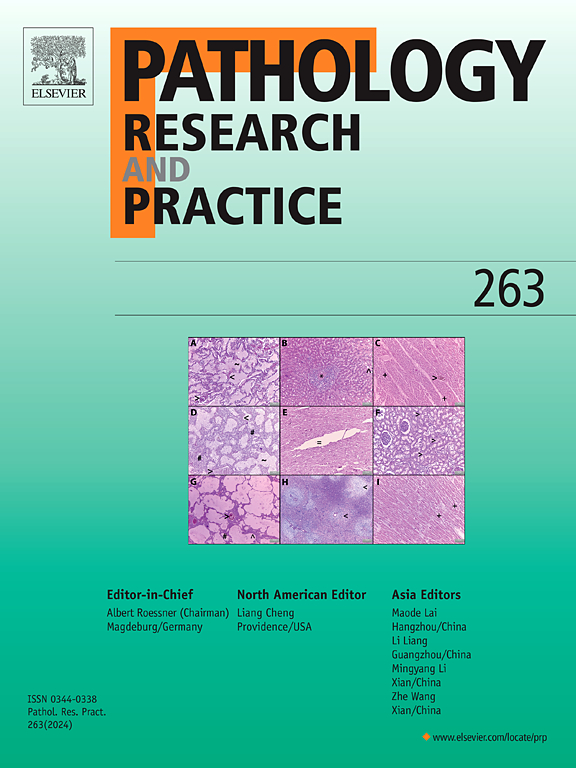The prognostic value of histological grade determined after neoadjuvant chemotherapy of breast cancer
IF 2.9
4区 医学
Q2 PATHOLOGY
引用次数: 0
Abstract
Histological grade is a validated prognostic factor of breast cancer but may show alterations following neoadjuvant chemotherapy (NACT). Its reporting after NACT is recommended by several guidelines, but evidence of its retained prognostic impact is scarce. Patients treated with NACT followed by surgery and having sufficient residual tumour for the determination of grade were analysed for the survival effects of posttreatment grade (yG). Kaplan-Meier analyses and the log-rank test were applied, followed by the univariable and multivariable Cox proportional hazards models. The cohort comprised 355 patients with known yG, and 320 of them had also a pretreatment grade available. Pretreatment grade changed in 99/320 (31 %) cases following NACT, and downgrading was more common (n=78/320, 24 %) than upgrading (21/320, 7 %). Among 355 breast cancer patients, those with yG3 (poorly differentiated) tumours (n=155) had worse 5-year relapse-free and overall survival estimates than those with yG2 (n=169) or yG1 (n=31) tumours. This was also substantiated by univariable analysis; however, yG lost its significance in the multivariable model. Post-NACT histological grade has a prognostic impact, but does not seem to be an independent prognosticator in the post-NACT setting; however, these results lend support for its reporting by pathologists after primary systemic treatment.
乳腺癌新辅助化疗后组织学分级的预后价值
组织学分级是乳腺癌的一个有效预后因素,但在新辅助化疗(NACT)后可能会发生变化。一些指南建议在新辅助化疗后报告组织学分级,但很少有证据表明组织学分级对预后仍有影响。我们分析了接受新辅助化疗(NACT)后进行手术治疗且有足够残留肿瘤可确定分级的患者治疗后分级(yG)对生存的影响。采用卡普兰-梅耶分析和对数秩检验,然后是单变量和多变量考克斯比例危险模型。研究对象包括355名已知yG的患者,其中320名患者的治疗前分级也已确定。在 NACT 之后,99/320(31%)例患者的治疗前分级发生了变化,降级(78/320,24%)比升级(21/320,7%)更常见。在355名乳腺癌患者中,yG3(分化差)肿瘤患者(155人)的5年无复发生存率和总生存率均低于yG2(169人)或yG1(31人)肿瘤患者。单变量分析也证实了这一点;但在多变量模型中,yG失去了重要性。NACT后组织学分级对预后有影响,但似乎不是NACT后的独立预后指标;不过,这些结果支持病理学家在初次系统治疗后报告组织学分级。
本文章由计算机程序翻译,如有差异,请以英文原文为准。
求助全文
约1分钟内获得全文
求助全文
来源期刊
CiteScore
5.00
自引率
3.60%
发文量
405
审稿时长
24 days
期刊介绍:
Pathology, Research and Practice provides accessible coverage of the most recent developments across the entire field of pathology: Reviews focus on recent progress in pathology, while Comments look at interesting current problems and at hypotheses for future developments in pathology. Original Papers present novel findings on all aspects of general, anatomic and molecular pathology. Rapid Communications inform readers on preliminary findings that may be relevant for further studies and need to be communicated quickly. Teaching Cases look at new aspects or special diagnostic problems of diseases and at case reports relevant for the pathologist''s practice.

 求助内容:
求助内容: 应助结果提醒方式:
应助结果提醒方式:


